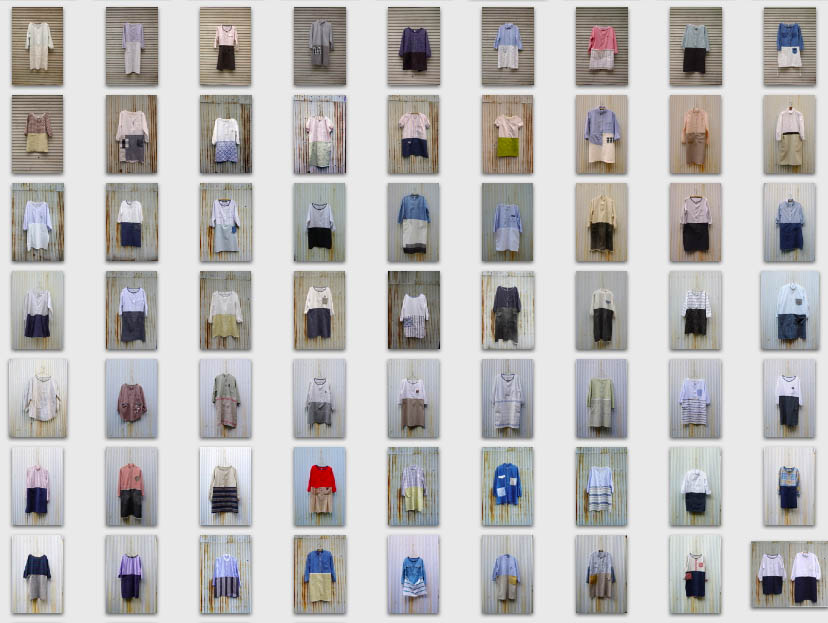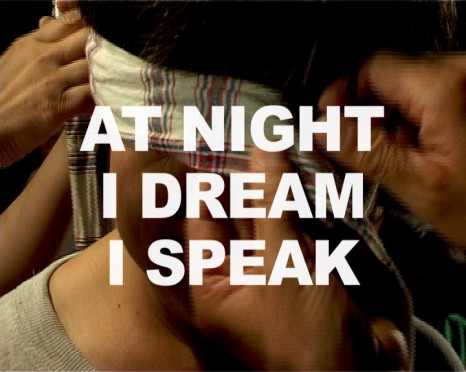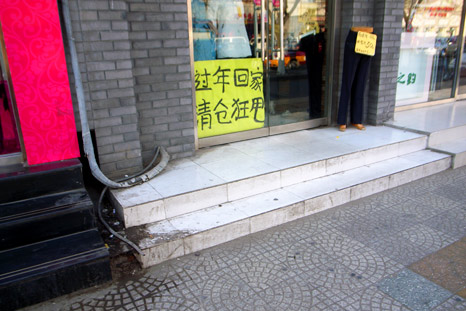
when i returned to Beijing after approximately one month away, i played the game, as always, of walking around the neighbourhood to see which places have disappeared in my absence, which new businesses or grand ambitions have moved in to replace the failing or derelict, a sort of remapping one’s estrangement within the city. i walked from xiaojingchang hutong to the northern end of andingmen nei, and with hands in pockets passed by a candy bar vendor (new), a book-laden cart full of pirated publications on technology/software (old), and a cardboard box stand topped with rows of socks (old). i walked into the andingmen hotel, where i end up sleeping for several nights, a new tourist in a now familiar city. there was a small exhibition and series of events happening in two of the rooms of the hotel, and it became a quiet but social place to welcome myself back into a place of growing certainty; this was a place delicately juxtaposed with all the awkwardness and adamance that one can have about one’s sense of place in the world. it was called “also space“. during these few days, there was a certain amount of presence, self-consciously experienced and toyed with, a space and socius to make one acutely aware of all the small details of showing and not knowing.
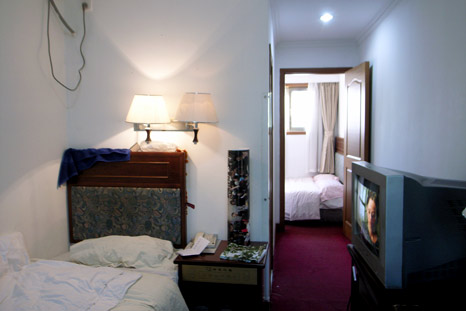
each morning i would wake from the hardish hotel bed in room 221, happy for warmth but tired for tiredness, enter the bathroom and begin to rearrange the selection of hotel offerings, as are commonly found in many temporary lodgings: two plastic wrapped soaps——packaged again in a printed cardboard box——three toothbrushes, two plastic combs with the hotel name in gold-coloured print. I took away one of the toothbrushes and replaced it with a toothbrush in similar packaging from another hotel. I added a plastic wrapped disposable razor labeled, “one to one”, not knowing which hotel i may have taken it from. another time and another space. a sewing kit from yet another hotel, travel-sized toothpaste from germany, travel-sized moisturizing lotion from hong kong. over the course of these few days, some of the items disappeared or were refilled by the service personnel, the blue towels were replenished with white ones. i thought about the possibility of being absolutely present in a place which one can deem home and not home at the same time. when the maid did not make the bed, i did it for her. but i left one of my hairs on the pillowcase along with a dried mandarin peel, and i wondered if any of our guests would notice and ask, “is this an artwork, too?” it’s a funny game to play, to observe everything in an unexpected place as possibly “art”. perhaps not so different from a game of trying to notice all the places that have disappeared or been born in one’s absence.
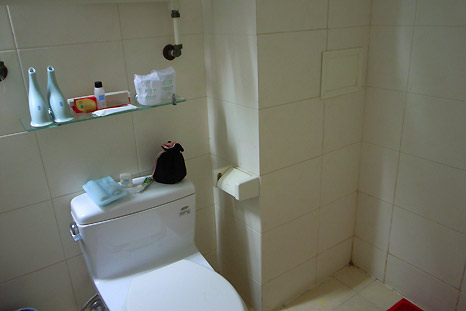
there was a certain consciousness of presence that i attempted to maintain in these days, living in a hotel in my “home” city. i commuted back and forth to my flat to change clothing, deliberately sprayed on too much perfume. i tried to pay attention to artworks, but fell asleep; a conversation would float past and i would suddenly remember something else that i was supposed to do. and only after a few treks between xiaojingchang and the northern end of andingmen nei did i notice the disappearance of the 24 hour Quick convenience store (old) and insertion of Bee’s cafe (new). Workers move on and on. Presence is a just-fading, a recognition of small distractions.
If we had not noticed the miniscule details of change, development and/or the passing of time around us, would we have missed a minor referencing of the present, a consciousness of our own time away from now, self-reference, a meta-presencing? Present that cannot exist, like a young architect asking questions in the form of statements about scale, he discovers his talk is not there——μετά as “after” or “beyond”, as “with”, “adjacent” and “self”.
Posted by 丫 | more »è‰²ã€…模様
ãªã‹ãªã‹æ•´ç†ã§ããšã«æ”¾ã£ã¦ã‚ã£ãŸã‹ã£ã½ã†ç€ã®å†™çœŸã‚’ã€æ˜Žæ—¥ã®ã‚»ãƒŸãƒŠãƒ¼ã®ãŸã‚ã«å°‘ã—æ•´ç†ã—ã¾ã—ãŸã€‚パソコンã®ãƒ‡ã‚£ã‚¹ãƒ—レイã«å°ã•ã並んã ã‹ã£ã½ã†ç€ãŒæ¥½ã—ãã£ã¦â€¦ã“ã†ã‚„ã£ã¦è¦‹ã‚‹ã¨è‰²ã€…作ã£ãŸã‚‚ã®ã§ã™ã€‚
Posted by anyway | reply »ã‹ã£ã½ã†ç€ã‚’作る一日
先週ã®æœ¨æ›œæ—¥ã€æ˜Ÿãƒ¶ä¸˜æ´‹è£å¦æ ¡ã§ç§‹ã®ãƒ•ã‚§ã‚¹ã‚¿ã®ç‰¹åˆ¥æŽˆæ¥ã¨ã—ã¦é–‹å‚¬ã•ã›ã¦ã„ãŸã ã„ãŸãƒ¯ãƒ¼ã‚¯ã‚·ãƒ§ãƒƒãƒ—ã¯ï¼•äººã®æ–¹ã«å‚åŠ ã—ã¦ã„ãŸã ãã¾ã—ãŸã€‚今回ã¯ãƒŸã‚·ãƒ³ã®è¨ å‚™ã®ãªã„ギャラリーã§ã®é–‹å‚¬ã¨ã„ã†ã“ã¨ã‚‚ã‚ã‚Šã€å½“åˆã¿ãªã•ã‚“ã«ã¯ã‚¨ãƒ—ãƒãƒ³ã®éƒ¨åˆ†ã ã‘を手縫ã„ã§ä½œã£ã¦ã„ãŸã ã予定ã ã£ãŸã®ã§ã™ãŒã€å‚åŠ ã•ã‚Œã¦ã„ãŸæ–¹ã®å¸Œæœ› ã‚‚ã‚ã‚Šã€ã‹ã£ã½ã†ç€ä½œã‚Šã®ä¸€é€šã‚Šã‚’一緒ã«é€²ã‚ã¦è¡Œã内容ã«å¤‰æ›´ã—ã¾ã—ãŸã€‚ãã®ãŸã‚ã€ä½œæ¥é‡ã®ã‹ãªã‚Šå¤šã„内容ã«ãªã‚Šã¾ã—ãŸãŒã€æ™‚間も大幅ã«å»¶é•·ã•ã›ã¦ã„ãŸã ãã€ãªã‚“ã¨ã‹ï¼•äººï¼•æ§˜ã®ã‹ã£ã½ã†ç€ã®å‡ºæ¥ã‚ãŒã‚ŠãŒã‚¤ãƒ¡ãƒ¼ã‚¸ã§ãã‚‹ã¨ã“ã‚ã¾ã§ä½œã‚Šã€ä»•ä¸Šã’ã¯è‡ªå®…ã§ã¨ã„ã†ã‹ãŸã¡ã§æŒã¡å¸°ã£ã¦ã„ãŸã ãã¾ã—ãŸã€‚
一 度ã«è©°ã‚込んã§ãŸãã•ã‚“ã®ã“ã¨ã‚’ã—ãŸã®ã§ã€å‚åŠ è€…ã®æ–¹ã¯ã¡ã‚‡ã£ã¨æ¶ˆåŒ–ä¸è‰¯â€¦ï¼ï¼Ÿã ã£ãŸã®ã§ã¯ã€ã¨å¿ƒé…ã—ã¦ã„ã¾ã™ãŒã€ä¸€é€šã‚Šæ‰‹ã‚’å‹•ã‹ã—ã¦ä»•ä¸Šã’ã‚Œã°ã€å€‹ã€…㮠作æ¥ã¸ã®ç†è§£ã‚‚後ã‹ã‚‰ä»˜ã„ã¦ãã‚‹ã¨æ€ã„ã¾ã™ã€‚ã¾ãŸå®Ÿéš›ç€ã¦ã¿ã‚‹ã“ã¨ã§ã‚‚ã€èº«ä½“ã®å‹•ãã¨è¡£æœã®æ§‹é€ ã®é–¢ä¿‚ã¨ã„ã†ã®ã‚‚経験ã§ãã¾ã™ã€‚ãœã²ã€ã¾ãŸï¼’ç€ç›®ã€ï¼“ç€ç›® ã«æŒ‘戦ã—ã¦ã„ãŸã ãã€è‡ªåˆ†ã«åˆã£ãŸç€ã‚„ã™ã„ã‹ã£ã½ã†ç€ã‚’発見ã—ã¦ã„ãŸã ã‘ã‚Œã°ã¨æ€ã„ã¾ã™ã€‚
後日ã€ã‚ã¡ã‚‰ã“ã¡ã‚‰ã‹ã‚‰ã€Œãƒ¯ãƒ¼ã‚¯ã‚·ãƒ§ãƒƒãƒ—ã€å‚åŠ ã—ãŸã‹ã£ãŸï¼ã€ã¨å£°ã‚’掛ã‘ã¦ã„ãŸã ãã¾ã—ãŸã€‚今回ã¯åˆã‚ã¦ã®è©¦ã¿ã§ã—ãŸãŒã€ã¾ãŸä»Šå›žã®åçœç‚¹ã‚’æ´»ã‹ã—ã¦ã€å†…容を整ç†ã—ãŸå½¢ã§ç¶šã‘ã¦ã„ã‘ãŸã‚‰ã¨æ€ã£ã¦ã„ã¾ã™ã€‚ブãƒã‚°ä¸Šã§ã¾ãŸã”案内ã•ã›ã¦ã„ãŸã ãã¾ã™ã。
ã ã‚Œã«ã—ã¦ã‚‚ã€æ˜Ÿãƒ¶ä¸˜æ´‹è£å¦æ ¡ã€ã»ã¨ã‚“ã©ä¸¸ä¸€æ—¥ã®æ™‚é–“ã‚’éŽã”ã•ã›ã¦ã„ãŸã ãã¾ã—ãŸãŒã€ã»ã‚“ã¨ã†ã«é™ã‹ãªæ™‚é–“ã®ãªãŒã‚Œã‚‹ã€ã™ã¦ããªå ´æ‰€ã§ã—ãŸã€‚ワークショップ ãŒã€ã†ã¾ã進ã‚られるã‹ã©ã†ã‹ã¨ã¦ã‚‚心é…ã§ã—ãŸãŒã€æ•·åœ°å†…ã«å…¥ã‚‹ã¨ã€å‰ã‹ã‚‰çŸ¥ã£ã¦ã„ãŸå ´æ‰€ã®ã‚ˆã†ã«å¿ƒãŒè½ã¡ç€ãã€ãã®æ°—æŒã¡ã‚’ã¾ã‚“ä¸ã«æ®ãˆã¦ã€è¡Œã†ã“ã¨ãŒ ã§ãã¾ã—ãŸã€‚ã‚ã‚ŠãŒã¨ã†ã”ã–ã„ã¾ã—ãŸã€‚
www.hibitann.exblog.jp |Â www.iwishicoulddescribeittoyoubetter.net/us/anyway/kappogi.html
Posted by anyway | more »all that glitters
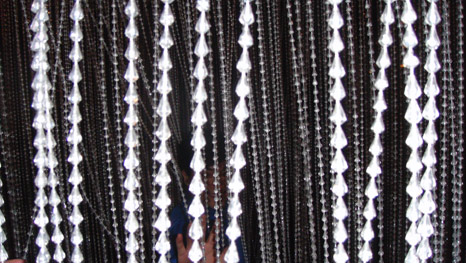 (for 邓利ã€æ¨é¸½ã€é™ˆå»¶å¨œ and 陈芳,on participation and parting)
(for 邓利ã€æ¨é¸½ã€é™ˆå»¶å¨œ and 陈芳,on participation and parting)
In an exergue to the collection of poems she entitled Requiem, Anna Akhmatova recounts how her poems were born. It was in the 1930s, and for months and months she joined the line outside the prison of Leningrad, trying to hear news of her son, who had been arrested on political grounds. There were dozens of other women in line with her. One day, one of these women recognized her and, turning to her, addressed her with the following simple question: “Can you speak of this?” Akhmatova was silent for a moment and then, without knowing how or why, found an answer to the question: “Yes,” she said, “I can.”
As Agamben notes, “I can” here does not mean a conviction of the possession of certain capacities that guarantee success in ‘describing’ the indescribable, but a radical acceptance of “the hardest and bitterest experience possible: the experience of potentiality.”
What is set upon the stage for potentiality, where “speech”, but also a refusal to speak can take place? Where do our bodies take us that our words do not? What transitory epics are written in the face, the things that tell you to wait, to feel, to know that this mess we’ve created is greater than ourselves?
things will change soon. i know it. to say, “i wish i could describe it to you better” is to turn around the thing, over and over and over again. like words, nearer and nearing to meaning, wavering infinitely close, proximitous without sameness. Can we speak of these unnameable spaces in between the named? Can you describe them, will you ever know that silence with me here, a glittering in darkness, a deafening roaring?
(partial text and thoughts from Giorgio Agamben, Potentialities, and Where Everything is Yet to Happen; photo from OVERSEAS, close by)
Posted by 丫 | reply »at night i dream i speak
for the full moon tonight, the others away or asleep…ä¸ç§‹å®‰
“晚上我åšæ¢¦è¯´è¯, 白天åšä¸äº†ä»€ä¹ˆ”
[still image from new work-in-progress, www.overseasproject.net]
Posted by 丫 | reply »in passing, black-capped chickadee
Michael writes to H.F: “We enjoy the space between being ‘in the know’ and simply being attentive to one’s social environment where the unexpected may occur, setting up an interaction that will provide a meaningful communication, ‘loading the decks’.”
[photos by 戴璞 Dai Pu]
It ends with a face in rain, or two, that washed away one after the other like passing faces in a party.
The next day, he sends me a message: “One day I will explain to you why things are so complicated.”
And then it becomes difficult to respond, silence an only recourse, uncovering to plot thickening. The loneliness amidst joyful crowds, like the stripping away of an impersonator who says, “I don’t know. I was born that way.”
People ask questions all the time to which we must answer, “I don’t know.” I can’t remember anymore which way it was when i was born, but somehow I always return to a letter read as a child, from an old woman. I read her as if I were her already, so confounded by the inexplicability of my thoughts, to the possibility of their being expressed. It seems now, in future, utterly impossible to answer any question asked of me. I find less and less the words to place the complexities of my feeling.
Perhaps now back outside of each of those moments, I could answer each of you in turn, eloquently and honestly. Like an old woman’s remembrance of the sound of a black-capped chickadee, a doing nothing kind of being or simply, so simply, the fullness of…
Posted by 丫 | reply »a comment to 什么是文化交æµ? 或者什么是性交?
– Cultural exchange – Interesting examination – Hm, difficult to define. I think everybody (as the videoclip proves) has their own definition. I added parts from the interview I made with the Chinese women. 文化交æµ? I was thinking of the word äº¤æµ and it reminded me of the question where I asked to define “性交”. And in addition, I thought Ouyang’s definition of cultural exchange was also very special…and fits to this question.
mï¼šä½ æ˜¯æ€Žä¹ˆç†è§£åšçˆ±çš„ï¼Ÿä½ ä»‹æ„么?
interview1: ä½ æ˜¯æŒ‡ä¸¤ä¸ªå¥³ç”Ÿä¹ˆï¼Ÿæˆ‘ok的。如果抛开å•è‚²ä¸‹ä¸€ä»£è¿™ä¸ªæƒ³æ³•ï¼Œè¿™æ˜¯äººçš„基本的生ç†éœ€æ±‚,很æ£å¸¸ã€‚
mï¼šä½ è§‰å¾—åšçˆ±å’Œæ€§äº¤æ˜¯ä¸€ä¸ªæ„æ€ä¹ˆï¼Ÿ
interview1:我觉得æ„æ€å·®ä¸å¤šï¼Œæ˜¯ä¸æ˜¯ä¸€ä¸ªè¤’义一个贬义啊?呃…ä¸å¤ªçŸ¥é“。
m:为什么是性交会有贬义?那个性是指什么?交是交æµå—?
interview1:呃…交,交æ¢ä¸€ä¸‹ä¸œè¥¿å§ã€‚交æ¢ä¸€ç§æ„Ÿå—,一ç§ä½“验å§ã€‚å¯èƒ½æœ‰äº›æ„Ÿè§¦åªèƒ½æ˜¯é€šè¿‡å¼‚性æ¥å¸¦ç»™ä½ 的。
m:那如果是两个男人在åšçˆ±ï¼Œä½ å¯ä»¥ç”¨æ€§äº¤æ¥å½¢å®¹å—?
interview1:呃…..ä¸çŸ¥é“,应该å¯ä»¥å§ã€‚性没有规定是åªæœ‰å¼‚性之间的å§ï¼Œæˆ‘ä¸å¤ªçŸ¥é“这个è¯ç©¶ç«Ÿåº”该怎么定义。
m: 那对女的æ¥è¯´å·®ä¸å¤šï¼Œé‚£è‡ªæ…°æ˜¯åšçˆ±å—?
interview1:我觉得åšçˆ±æ˜¯ä¸¤ä¸ªäººçš„事情,而自慰是一个人的,å¯èƒ½æ•ˆæžœæ˜¯ä¸€æ ·çš„,但心里感觉ä¸ä¸€æ ·å§ã€‚
interview1: å› ä¸ºæ¯ä¸ªäººéƒ½å¯¹è‡ªå·±çš„身体很好奇,我觉得很æ£å¸¸ã€‚但是å¯èƒ½è‡ªæ…°è¿™ä¸ªè¯åœ¨æˆ‘è„‘æµ·ä¸å‡ºçŽ°çš„比较晚,所以我ä¸æ˜¯å¾ˆäº†è§£ï¼Œä½†æ˜¯å½“它出现的时候我还是å¯ä»¥æŽ¥å—的。å¯èƒ½å¦‚æžœå†å‡ºçŽ°çš„早一点,å°å¦åˆä¸çš„è¯ï¼Œæˆ‘å°±ä¸èƒ½å¤Ÿç†è§£ã€‚
mï¼šä½ èƒ½ç”¨ä½ è‡ªå·±çš„è¯æ¥è§£é‡Šä¸€ä¸‹â€œåšçˆ±â€æˆ–者“性交â€å—?
interview2:是åè¯è§£é‡Šå—?就是很自然的一ç§è¡Œä¸ºå§ã€‚然åŽï¼Œé‚£æ˜¯ç”Ÿæ´»çš„一部分。è¬å¦‚è¯´ï¼Œå¦‚æžœä½ æŠŠå…´è¶£çˆ±å¥½å’Œå·¥ä½œæ”¾åœ¨ä¸€èµ·ï¼Œç„¶åŽä½ 的感情生活和性生活åˆæ˜¯ä¸€å—东西。如果说定义的è¯ï¼Œå°±æ˜¯ç”Ÿæ´»çš„一部分而已,没觉得有太多别的东西… 其实我也ä¸æ˜¯ç»å¸¸ä¼šæœ‰è¿™æ ·çš„ä½“åŠ›æ´»åŠ¨ï¼Œä½†æ˜¯æˆ‘ä»¬éƒ½ä¼šå¸Œæœ›ä¼šæœ‰ä¸€ä¸ªç¨³å®šçš„ä¸œè¥¿ï¼Œå› ä¸ºé‚£æ ·â‹¯â‹¯å°±åƒæˆ‘之å‰è·Ÿä½ è¯´è¿‡çš„ï¼Œæˆ‘è§‰å¾—ä¸¤æ ·ä¸œè¥¿æ˜¯ä¸å¯ä»¥åˆ†å¼€çš„ã€‚ï¼ˆæ€§ï¼‰æ˜¯ä¸€ä¸ªä½ å¸Œæœ›å®ƒèƒ½å¤Ÿç¨³å®šè€Œæœ‰æ•…äº‹çš„ä¸œè¥¿ã€‚å¦‚æžœéžè¦è§£é‡Šçš„è¯ï¼Œæˆ‘会觉得是一ç§å¿…需å“,ä¸ä¸€å®šåœ¨æ¯ä¸ªé˜¶æ®µéƒ½ä¼šå‡ºçŽ°ï¼Œä½†æ˜¯å®ƒä¼šæ˜¯å¿…需å“。
mï¼šä½ è§‰å¾—â€œåšçˆ±â€å’Œâ€œæ€§äº¤â€çš„æ„æ€æ˜¯ä¸€æ ·çš„å—?
interview2:我觉得“性交â€ä¹ŸåŒ…括动物对å—,但“åšçˆ±â€æ˜¯äººæ‰ç”¨çš„ï¼Œä½ ä¸ä¼šè¯´ï¼Œåœ¨è¡—上看到两æ¡ç‹—在åšçˆ±ã€‚哎,但是也å¯ä»¥ï¼Œå¥½åƒä¹Ÿå¯ä»¥è¿™ä¹ˆè¯´ã€‚“性交â€æ„Ÿè§‰æ˜¯å†™åœ¨ä¹¦ä¸Šçš„å—…“性交â€å¬èµ·æ¥æœ‰åŠ¨ç‰©æ€§ã€‚ä½ ä¸ä¼šè·Ÿä½ 的男朋å‹è¯´ï¼Œæˆ‘们æ¥â€œæ€§äº¤â€å§ï¼Œä½ 会觉得这å¥è¯è¯´å‡ºæ¥ç‰¹åˆ«æ¥žã€‚ä½†ä½ ä¼šè¯´ï¼Œæˆ‘ä»¬â€œåšçˆ±â€å§ã€‚
Posted by mon | reply »ä»€ä¹ˆæ˜¯æ–‡åŒ–交æµï¼Ÿ | what is cultural exchange?
on projection at 玩世ä¸æ文化交æµBBQ a cynical cultural exchange barbecue, 家作åŠHomeShop Beijing, 11 July 2009
Posted by 丫 | more »